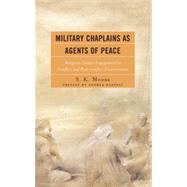Military Chaplains as Agents of Peace Religious Leader Engagement in Conflict and Post-Conflict Environments
, by Moore, S. K.- ISBN: 9780739149102 | 0739149105
- Cover: Hardcover
- Copyright: 12/19/2012
The incendiary language of faith group leaders reinforcing the religious imperative to embrace violence as a divine duty or sacramental act has become a means of deepening existing cultural and political fault lines, fueling the justification of militancy and terrorism-a factor of contemporary conflict. Globally, where faith and political processes share the public space within indigenous populations, religious leaders of tolerant voice, desirous of transcending the conflict that often divides their peoples, are coming forward. Affirming and enabling these leaders is increasingly becoming the focus of the reconciling efforts of peacebuilders both internal and external to existing conflict. Western governments continue to confront the export of terrorism and strive to stabilize nascent democracies, necessitating the deploying of troops to conflict and post-conflict operational environments. Accompanying them are military chaplains-religious leaders in uniform committed to providing sacramental and pastoral support. A trend is emerging within Operations whereby chaplains are networking with religious leaders of tolerant voice at local, regional and sometimes national levels-Religious Leader Engagement (RLE). Trust building through continued dialogue has facilitated opportunities for inter-religious encounter between estranged faith community leaders where the propaganda of long-held perceptions of the other begins to lose its strength-a rehumanizing of the other. Partnering with other actors has aided in meeting identified community need, while additional initiatives have focused on peacebuilding endeavors via collaborative activities designed to promote integrative approaches to inter-communal cooperation: the writing of new narratives. Falling within the Comprehensive Approach to operations, chaplains are noting a greater affinity with their Whole of Government partners where 'bottom-up' endeavors may be sustained and advanced by 'top-down' structures. By way of theoretical analysis and documented case studies from a number of countries, Military Chaplains as Agents of Peace considers RLE as an emerging domain that advances the cause of reconciliation via the religious peacebuilding of chaplains-a construct that may be generalized to expeditionary, humanitarian and domestic operational contexts. An overview of the benefits and limitations of RLE is offered accompanied by a candid discussion of a number of the more perplexing questions related to such operational ministry: Influence Activities, Information Gathering for Intelligence Purposes and the Protected (Non-Combatant) Status of Chaplains.






